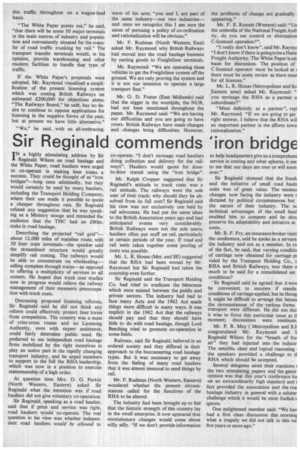Sir Reginald commends 'iron bridge
Page 57

If you've noticed an error in this article please click here to report it so we can fix it.
IN a highly stimulating address by Sir Reginald Wilson on road haulage and the White Paper, road hauliers were urged to co-operate in making liner trains a success. They could be thought of as "iron bridges"—long ones admittedly, but they would certainly be used by many hauliers, including the Transport Holding Company, where their use made it possible to quote a cheaper throughout rate. Sir Reginald refuted any suggestion that he was speaking as a Ministry stooge and reminded the audience that the THC had an £80m. stake in road haulage.
Describing the projected "rail grid"— about 12,000 miles of mainline route, with 50 liner train terminals—the speaker said the streamlined structure would greatly simplify rail costing. The railways would be able to concentrate on wholesaling— selling complete through trains—as opposed to offering a multiplicity of services to all corners. He hoped that track cost studies now in progress would relieve the railway management of their mesmeric preoccupation with track costs.
Discussing proposed licensing reforms, Sir Reginald said he did not think any reform could effectively protect liner trains from competition. The country was a mass of criss-cross routes and no Licensing Authority, even with expert assistance, could fairly determine public need. He preferred to see independent road haulage firms mobilized by the right incentives to play an active part in the rapidly changing transport industry, and he urged members to support to the full the RHA leadership, which was now in a position to exercise statesmanship of a high order.
At question time Mrs. D. G. Parkin (North Western, Eastern) asked Sir Reginald what the intention was if road hauliers did not give voluntary co-operation.
Sir Reginald, speaking as a road haulier, said that if price and service was right, road hauliers would co-operate. The real question in his view was whether independent road hauliers would be allowed to
co-operate. "I don't envisage road hauliers doing collection• and delivery for the railways". Hauliers would quote for doorto-door transit using the "iron bridge".
Mr. Ralph Cropper suggested that Sir Reginald's attitude to track costs was a rail attitude. The railways were the sole user of their track; why should they be absolved from its full cost? Sir Reginald said his view was not exclusively one held by rail advocates. He had put the same ideas to the British Association years ago and had anticipated events very considerably. British Railways were not the sole users; hauliers often put stuff on rail, particularly at certain periods of the year. If road and rail wete taken together some pooling of costs was possible.
Mr. L. R. House (Met. and SE) suggested that the RHA had been wooed by Mr. Raymond but Sir Reginald had taken the courtship even further.
Sir Reginald said the Transport Holding Co. had tried to eradicate the bitterness which once existed between the public and private sectors. The industry had had to face many Acts and the 1962 Act made things more difficult in many ways. It was implicit in the 1962 Act that the railways should pay and that they should have little to do with road haulage, though Lord Beeching tried to promote co-operation in some fields.
Railmen, said Sir Reginald, believed in an ordered society and they differed in their approach to the buccaneering road haulage types. But it was necessary to get away from the feeling of many road hauliers that it was almost immoral to send things by rail.
Mr. F. Rudman (North Western, Eastern) wondered whether the present circumstances called for the functions of the RHA to be altered.
The industry had been brought up to feel that the historic strength of this country lay in the small enterprise. It now appeared that revolutionary changes would come about willy filly. "If we don't provide information
to help headquarters give us a comprehens service in costing and other spheres, it see, to me that our days are over or will soon over."
Sir Reginald stressed that the freed( and the initiative of small road haula units •was of great value. The necessa changes now facing the industry were r dictated by political circumstances but the nature of their industry. The ix technical advantages Of the small haul enabled him to compete and he shot preserve his adaptability and initiative at costs.
Mr. B. F. Fry, an insurance broker visiti the conference, said he spoke as a servant the industry and not as a member. In vi( of the fact, he said, that varying conditio of carriage now obtained for carriage pi vided by the Transport Holding Co., t RHA and British Railways, was there n much to be said for a consolidated set conditions?
' Sir Reginald said he agreed that it wou be convenient to insurers if standa conditions of carriage applied, but he thoug it might be difficult to arrange this becau the circumstances of the various forms transport were different. He did not thir it wise to force this particular issue at ti moment; discussions were continuin, Mr. P. R. May ( Metropolitan and S.E congratulated Mr. Raymond and S Reginald Wilson for the "breath of fre; air" they had injected into the industr The sensible, clear and logical reasoning the speakers provided a challenge to ti RHA which should be accepted.
Several delegates aired their reactions i the two stimulating papers and the gener opinion was that this year's conference ha set an extraordinarily high standard and i fact provided the association and the roa haulage industry in general with a salutar challenge which it would be most foolish t ignore.
One enlightened member said: "We hay had a first class discussion this morninE what a tragedy we did not talk in this vei five years or more ago."












































































































































